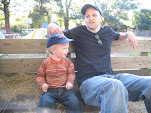This post is a review by Ryan Bolger on Breaking the Missional Code, by Ed Stetzer and David Putnam. In the review he critiques their use of Christian and non-Christian, believing that it implies "that that church is inherently good and unchurched is correspondingly bad." Instead, he believes that a better language might be in order. He prefers the terms "bounded and centered."
Tim Keller gives the following descriptions of bounded and centered sets...
In mathematics, there are two different ways to define a 'set'. One is a 'bounded set'. A point is in the set if it is related properly to (i.e. if it is inside) the boundary. Another is the 'centered set'. A point is in the set if it is related properly to (i.e. if it is in alignment with or moving toward) the center of the set. Organizations that are 'bounded sets' put great emphasis on the lines of demarcation 'around the circle' – at all points. 1) A person cannot work with or be part of the organization in any meaningful sense without the rite of initiation and the adoption of extensive standards which set the person apart. 2) Differences between members and the outside world are emphasized. 3) Membership is defined in terms of common beliefs and policies and folkways that are pretty extensive. Organizations that are centered-sets put more emphasis on central goals and commitments. 1) A person can work with the organization as long as it shares basic goals and is willing to work for them. 2) Differences between members and the outside world are not emphasized. 3) Membership is defined in terms of active participation toward common tasks and goals.
Bolger says it this way: "What matters is not whether we are in or out (churched or unchurched), but instead it is our direction that matters – are we moving closer to the King (or Kingdom) or moving further away?"
He goes on to say:
Why is that important? Well, given our knowledge of history, we see that some churches do not exhibit kingdom aspects -- they do not manifest the fruits of the spirit, nor do they stand for justice in the world. Using Hiebert’s rubric, these churches would be moving away from the center. Conversely, some unchurched people serve the poor (among many other good things) and are moving in God’s direction. Again, we measure what we value, and church, apart from kingdom activities, becomes a club, a lifestyle enclave, a meaningless endeavor. Indeed, the church is dependent on its mission for its very identity. So, kingdom and movement are better markers of faithfulness to the gospel than are churched and unchurched.
My friend Linda Bergquist first explained bounded and centered sets to me about four years ago. I have to admit that at first I really didn't understand what she was talking about. However, as I have been placed by God into cultures that were either apathetic or hostile to the gospel and to church, I have begun to see the importance of this.
Friday, May 4, 2007
Subscribe to:
Post Comments (Atom)

1 comment:
Great post. These neat churched and unchurched categories don't really describe reality do they? And "unchurched" people know it.
Post a Comment